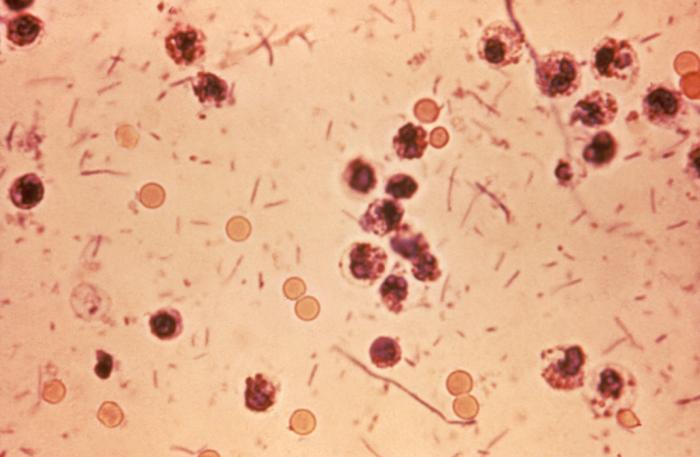Pathogen
 In biology, a pathogen (, "suffering", "passion" and , "producer of"), in the oldest and broadest sense, is any organism or agent that can produce disease. A pathogen may also be referred to as an infectious agent, or simply a germ.
In biology, a pathogen (, "suffering", "passion" and , "producer of"), in the oldest and broadest sense, is any organism or agent that can produce disease. A pathogen may also be referred to as an infectious agent, or simply a germ.The term ''pathogen'' came into use in the 1880s. Typically, the term ''pathogen'' is used to describe an ''infectious'' microorganism or agent, such as a virus, bacterium, protozoan, prion, viroid, or fungus. Small animals, such as helminths and insects, can also cause or transmit disease. However, these animals are usually referred to as parasites rather than pathogens. The scientific study of microscopic organisms, including microscopic pathogenic organisms, is called microbiology, while parasitology refers to the scientific study of parasites and the organisms that host them.
There are several pathways through which pathogens can invade a host. The principal pathways have different episodic time frames, but soil has the longest or most persistent potential for harboring a pathogen.
Diseases in humans that are caused by infectious agents are known as pathogenic diseases. Not all diseases are caused by pathogens, such as black lung from exposure to the pollutant coal dust, genetic disorders like sickle cell disease, and autoimmune diseases like lupus. Provided by Wikipedia
-
1by Bacterial Foodborn Pathogens and Mycology Research, USDA-ARS (18795061)
Published 2014Dataset bibliotecaUSDA US -
2
-
3BIOLOGY AND CONTROL OF SOIL- BORNE PLANT PATHOGENS : THIRD INTERNATIONAL SIMPOSYUM ON FACTORS DETERMINING THE BEHAVIOR OF PLANT PATHOGENS IN SOIL HELD AT UNIVERSITY OF MINESOT... BIOLOGY AND CONTROL OF SOIL- BORNE PLANT PATHOGENS : THIRD INTERNATIONAL SIMPOSYUM ON FACTORS DETERMINING THE BEHAVIOR OF PLANT PATHOGENS IN SOIL HELD AT UNIVERSITY OF MINESOT...by INTERNATIONAL SYMPOSIUM ON FACTORS DETERMINIG THE BEHAVIOR OF PLANT PATHOGENS IN SOIL (3 : 1973, UNIVERSITY MINESOTA ), BRUEHL, G. W. ED.Texto bibliotecaUAAAN MX
-
4
-
5Root diseases and soil-borne pathogens second International Symposium on factors determining of plant pathogens Root diseases and soil-borne pathogens second International Symposium on factors determining of plant pathogensby International Symposium on Factors Determining the Behavior of Plant Pathogens in Soil 2nd 1968 Imperial College, London, Toussoun, T. A. editor, Bega, Robert V. editor, Nelson, Paul E. editor
Published 1970Texto bibliotecaECOSUR -
6
-
7DNA-based Molecular Diagnostic Techniques: research needs for standardization and validation of the detection of aquatic animal pathogens and diseases. Report and Proceedings DNA-based Molecular Diagnostic Techniques: research needs for standardization and validation of the detection of aquatic animal pathogens and diseases. Report and Proceedingsby Walker, P. 1423211771626, FAO, Rome (Italy). Fisheries Dept. eng 184263, Expert Workshop on DNA-Based Molecular Diagnostic Techniques: Research Needs for Standardization and Validation of the Detection of Aquatic Animal Pathogens and Diseases eng 7-9 Feb 1999 Bangkok (Thailand) 11337, Subasinghe, R. 1423211769745
Published 2000Texto bibliotecaFAO IT -
8by Rifai, M.A. (ed.), Southeast Asian Regional Center for Tropical Biology, Bogor (Indonesia) eng, Symposium on Crop Pathogens and Nematodes eng 7-9 Apr 1987 Bogor (Indonesia), Machmud, M. (ed.), Sastraatmadja, A.H. (ed.), Tjitrosomo, S.S. (ed.), Umaly, R.C. (ed.)
Published 1988Texto bibliotecaFAO IT -
9by MONTALVA, C., COLLIER, K., ROCHA, L. F. N., INGLIS, P. W., LOPES, R. B., LUZ, C., HUMBER, R. A.Other Authors: “... EMERGING PESTS AND PATHOGENS RESEARCH UNIT, USA....”
Published 2017-01-23
Separatas bibliotecaEMBRAPA -
10by LOPES, R. B., SOUZA, D. A. de, ROCHA, L. F. N., MONTALVA, C., LUZ, C., HUMBER, R. A., FARIA, M.Other Authors: “.... HUMBER, USDA-ARS EMERGING PESTS AND PATHOGENS RESEARCH UNIT, USA; MARCOS RODRIGUES DE FARIA, Cenargen....”
Published 2018-05-22
Separatas bibliotecaEMBRAPA




